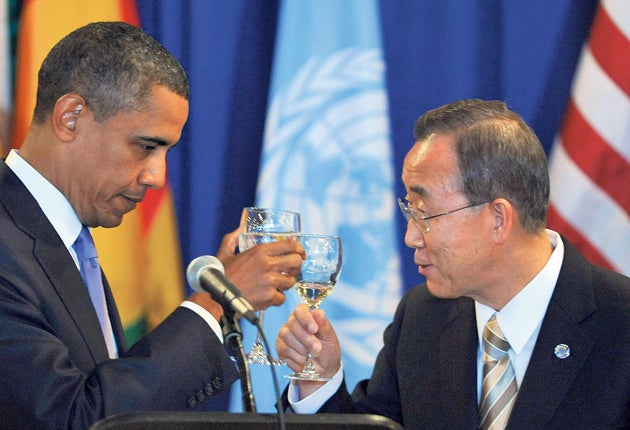Seize chance of peace, Obama urges Israel and Palestinians
US President focuses on Middle East and Iran in address to UN General Assembly

Your support helps us to tell the story
From reproductive rights to climate change to Big Tech, The Independent is on the ground when the story is developing. Whether it's investigating the financials of Elon Musk's pro-Trump PAC or producing our latest documentary, 'The A Word', which shines a light on the American women fighting for reproductive rights, we know how important it is to parse out the facts from the messaging.
At such a critical moment in US history, we need reporters on the ground. Your donation allows us to keep sending journalists to speak to both sides of the story.
The Independent is trusted by Americans across the entire political spectrum. And unlike many other quality news outlets, we choose not to lock Americans out of our reporting and analysis with paywalls. We believe quality journalism should be available to everyone, paid for by those who can afford it.
Your support makes all the difference.Barack Obama staked his prestige yesterday on direct Middle East peace talks, telling world leaders in New York that he wants a permanent agreement finalised within 12 months that "will lead to a new member of the United Nations – an independent state of Palestine, living in peace with Israel".
In only his second speech to the UN General Assembly as US President, Mr Obama also told Iran that despite further international sanctions imposed in June because of the country's nuclear enrichment activities, "the door remains open to diplomacy". But the US and UK delegations later walked out on the speech by Iranian President Mahmoud Ahmadinejad when he cast doubt on the guilt of al-Qa'ida in the 9/11 terror attacks.
Mr Obama's address, which also covered the world economy and climate change, was a fresh reminder that on the twin issues of Israeli-Palestinian relations and Iran, Mr Obama is facing challenges and opportunities that will define his legacy on the world stage. Direct negotiations between the Palestinians and Israel finally resumed earlier this month.
Mr Obama and the Israeli Prime Minister, Benjamin Netanyahu, now stand on the threshold of a historic breakthrough. But all could fall apart this weekend, as a moratorium set by Mr Netanyahu on new Jewish settlements in the occupied territories is due to expire. If Mr Netanyahu were to allow construction to resume, the talks would probably be over almost as quickly as they started.
With Israeli diplomats absent from the hall because of a Jewish holiday, Mr Obama reiterated that such an outcome should not be allowed to happen. "Our position on this issue is well known," he said. "We believe that the moratorium should be extended. We also believe that talks should press on until completed."
But the President also had direct language for Arab nations, saying they should play a greater part promoting peace. They "must stop trying to tear Israel down," he said, adding: "Those who have signed on to the Arab Peace Initiative should seize this opportunity to make it real by taking tangible steps toward the normalisation that it promises Israel".
Without a deal, he warned, "more blood will be shed" and "this Holy Land will remain a symbol of our differences, instead of a symbol of our common humanity."
His parallel focus on Iran was also no surprise, given that a year of cajoling and threatening by the West has been met with little but defiance in Tehran. The UN sanctions imposed in the summer were followed up by similar measures by the European Union and the US.
A new peace map in 12 months would be one thing, but Mr Obama made no mention of where the world might be by that time if the dispute with Iran over its nuclear intentions has not been resolved. The two issues are not entirely separable. Israel continues to leave open the option of military strikes.
There has been optimism that Iran may be ready to re-engage in talks on the nuclear dossier, broken off last year. "Iran has already been ready for dialogue based on faith and justice," President Ahmadinejad said at the podium later. Yet in the same speech, he contrived, in New York of all places, to rehearse doubts about who perpetrated the 9/11 attacks.
One theory, he said, was "that some segments within the US government orchestrated the attack to reverse the declining American economy, and its grips on the Middle East, in order to save the Zionist regime." He went on: "The majority of the American people as well as most nations and politicians around the world agree with this view." At this point, both the US and Britain strode out of the hall.
Mr Obama said in his speech that a diplomatic solution remained possible, but his tone was tough. "The Iranian government must demonstrate a clear and credible commitment, and confirm to the world the peaceful intent of its nuclear programme."
In his address to delegates from 192 countries, the UN Secretary General, Ban Ki-moon, said the world was becoming more politically polarised. "We hear the language of hate, false divisions between 'them' and 'us,' those who insist on 'their way' or 'no way,'" he said, noting that the lives of millions are being affected, not just by military conflicts but also by economic upheaval and unemployment.
With America's mid-term elections just weeks away, Mr Obama sought also to highlight the progress made to combat the global recession. "I have had no greater focus as President than rescuing our economy from potential catastrophe," he said.
Join our commenting forum
Join thought-provoking conversations, follow other Independent readers and see their replies
Comments